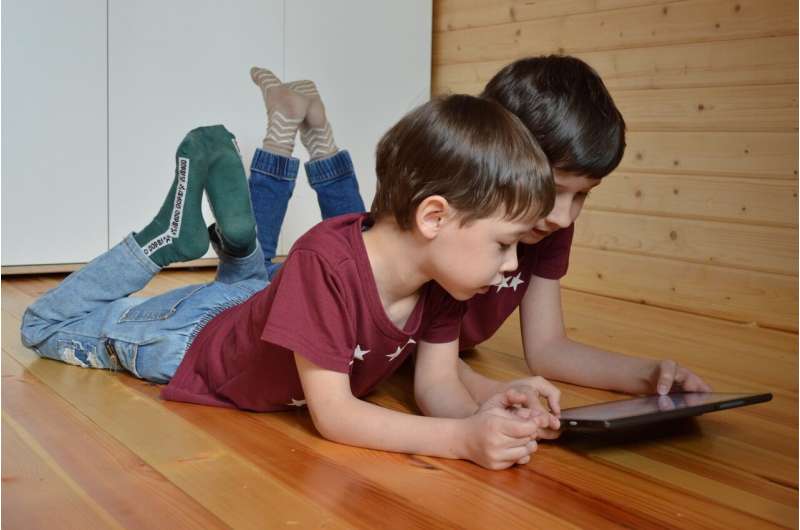Analysis of children’s screen time studies shows both positive and negative outcomes
By analyzing the results of many prior studies on the use of screen-based technologies by children, an international team of psychologists and human biomechanics researchers has found mixed outcomes. In their study, reported in the journal Nature Human Behavior, the group obtained and filtered data from previous research results to draw conclusions about the impact of screen time on children’s health and well-being. The editors at Nature have also published a Research Briefing outlining the work.
As the researchers note, a large number of studies over the past several decades have explored whether it is healthy for children to use screen-based technology devices—and if so, if the amount of screen time makes any difference in their health and well-being. The research team searched the current literature and found 2,451 studies involving nearly 2 million participants up to age 18. They tossed out any study results with small cohorts that had a bias or that lacked consistency. That left them with 681 studies.
The researchers then conducted an analysis of the remaining studies, looking for results that indicated either a positive or negative impact on the child subjects. Positive or negative impacts included health, education and sociability.
They found mixed results based on the type of technology and how it was being used. For example, they found that watching TV generally led to lower test scores in the children under study, unless they were watching with an adult. They also found that literacy was generally reduced when they analyzed overall screen time—the more time children spent looking at screens, the lower their reading scores. They also found that advertising on digital devices often led to unhealthy food choices, and engagement with social media sometimes led to increased symptoms of depression.
But the overriding finding was that virtually all the impacts were minor, suggesting that parents may not need to worry as much as they have been led to believe regarding how much time their kids spend looking at digital screens.
More information:
Taren Sanders et al, An umbrella review of the benefits and risks associated with youths’ interactions with electronic screens, Nature Human Behaviour (2023). DOI: 10.1038/s41562-023-01712-8
Weighing the risks and benefits of screen time for children, Nature Human Behaviour (2023). DOI: 10.1038/s41562-023-01713-7
© 2023 Science X Network
Citation:
Analysis of children’s screen time studies shows both positive and negative outcomes (2023, November 14)
retrieved 14 November 2023
from https://phys.org/news/2023-11-analysis-children-screen-positive-negative.html
This document is subject to copyright. Apart from any fair dealing for the purpose of private study or research, no
part may be reproduced without the written permission. The content is provided for information purposes only.

By analyzing the results of many prior studies on the use of screen-based technologies by children, an international team of psychologists and human biomechanics researchers has found mixed outcomes. In their study, reported in the journal Nature Human Behavior, the group obtained and filtered data from previous research results to draw conclusions about the impact of screen time on children’s health and well-being. The editors at Nature have also published a Research Briefing outlining the work.
As the researchers note, a large number of studies over the past several decades have explored whether it is healthy for children to use screen-based technology devices—and if so, if the amount of screen time makes any difference in their health and well-being. The research team searched the current literature and found 2,451 studies involving nearly 2 million participants up to age 18. They tossed out any study results with small cohorts that had a bias or that lacked consistency. That left them with 681 studies.
The researchers then conducted an analysis of the remaining studies, looking for results that indicated either a positive or negative impact on the child subjects. Positive or negative impacts included health, education and sociability.
They found mixed results based on the type of technology and how it was being used. For example, they found that watching TV generally led to lower test scores in the children under study, unless they were watching with an adult. They also found that literacy was generally reduced when they analyzed overall screen time—the more time children spent looking at screens, the lower their reading scores. They also found that advertising on digital devices often led to unhealthy food choices, and engagement with social media sometimes led to increased symptoms of depression.
But the overriding finding was that virtually all the impacts were minor, suggesting that parents may not need to worry as much as they have been led to believe regarding how much time their kids spend looking at digital screens.
More information:
Taren Sanders et al, An umbrella review of the benefits and risks associated with youths’ interactions with electronic screens, Nature Human Behaviour (2023). DOI: 10.1038/s41562-023-01712-8
Weighing the risks and benefits of screen time for children, Nature Human Behaviour (2023). DOI: 10.1038/s41562-023-01713-7
© 2023 Science X Network
Citation:
Analysis of children’s screen time studies shows both positive and negative outcomes (2023, November 14)
retrieved 14 November 2023
from https://phys.org/news/2023-11-analysis-children-screen-positive-negative.html
This document is subject to copyright. Apart from any fair dealing for the purpose of private study or research, no
part may be reproduced without the written permission. The content is provided for information purposes only.
